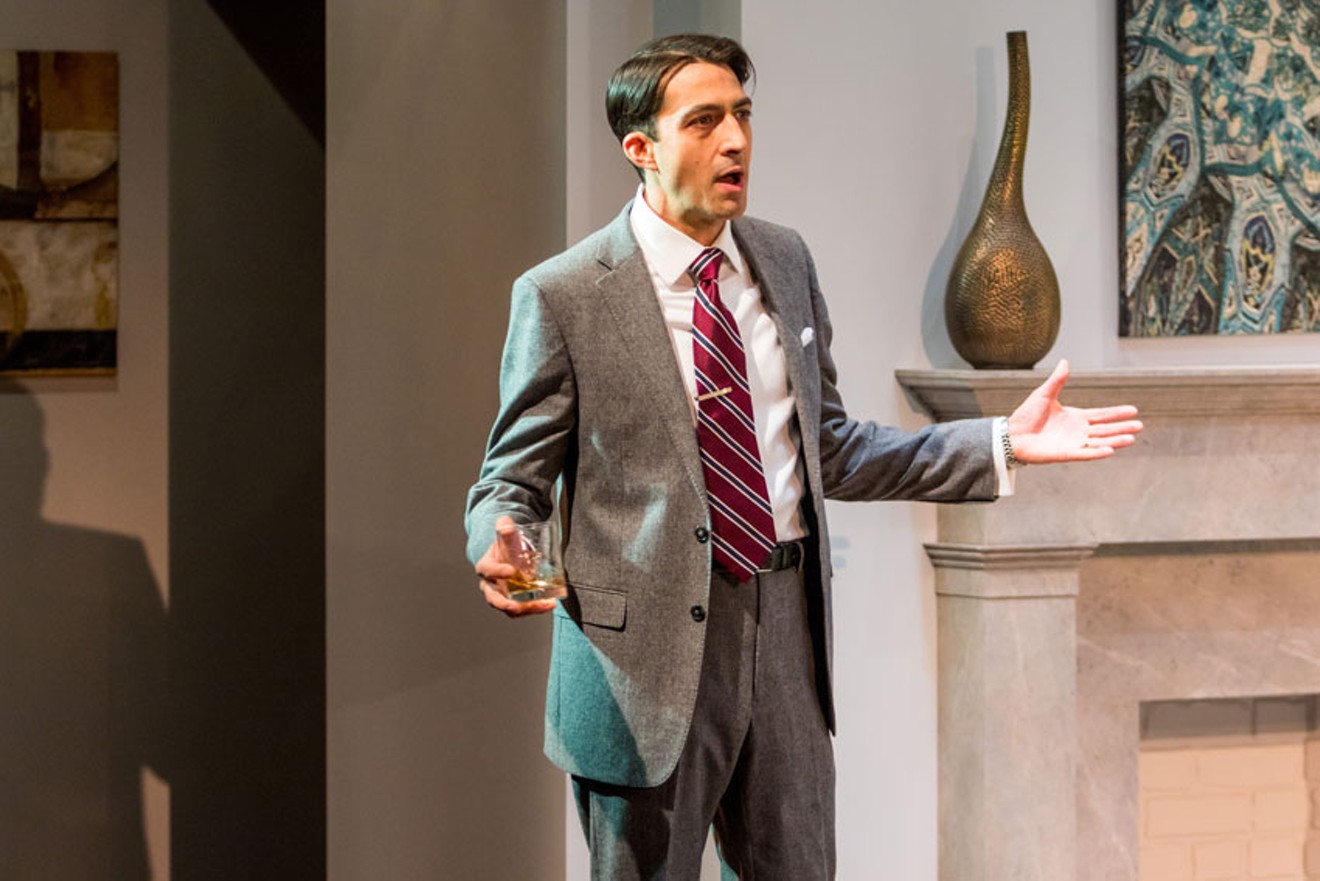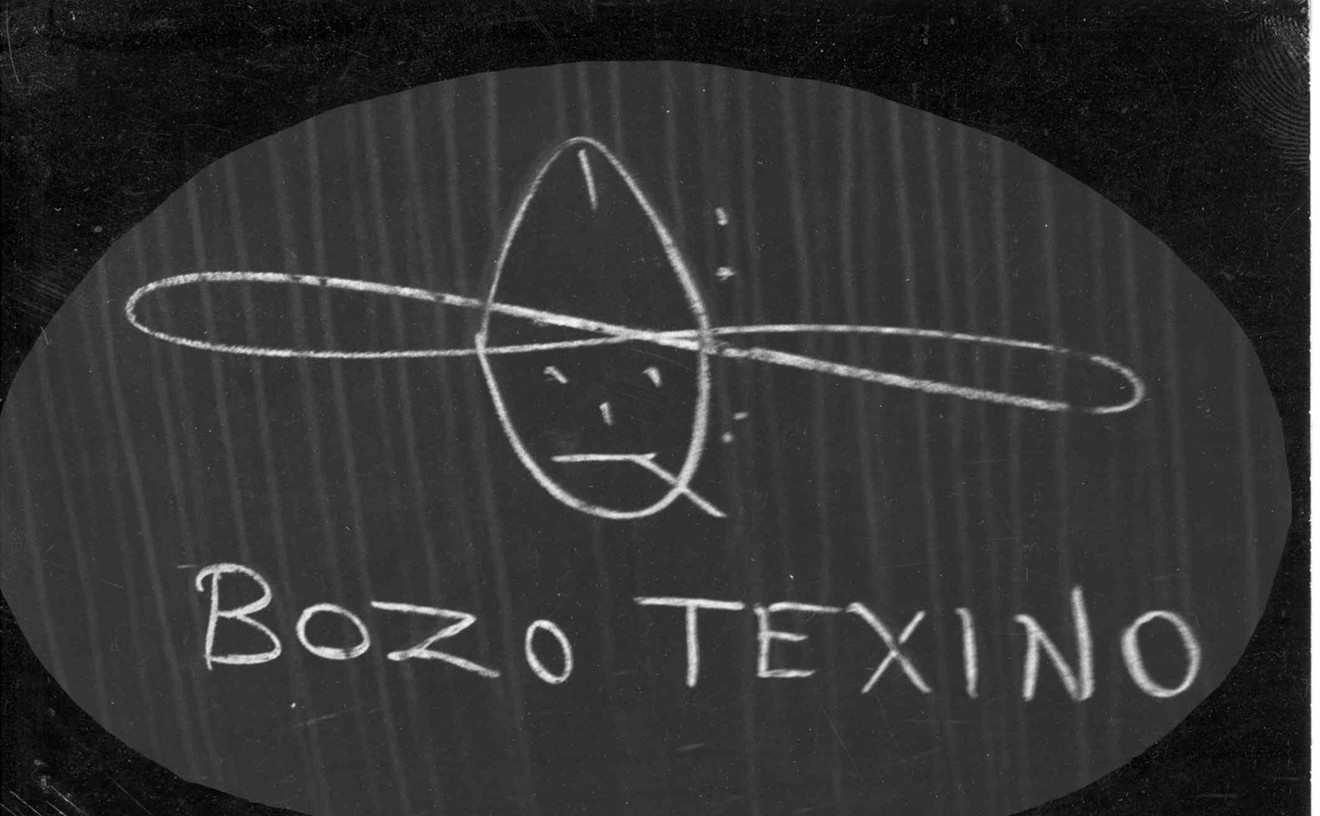I’ve been trying to moderate my immediate reaction to Ayad Akhtar’s Disgraced: that it’s a nasty, mean-spirited, dangerous and anti-Muslim piece of work, and I have no idea why a Pulitzer committee would have awarded it the 2013 prize for drama. But I can’t.
The play falls into the general category of “civilized people meet for dinner, drink a lot, and eventually reveal their uncivilized inner selves”— the same category as Yasmina Reza’s The God of Carnage, which is a whole lot funnier. Ambitious and highly paid lawyer Amir Kapoor, a Pakistani who identifies as Indian so that no one will take him for a Muslim, and his wife, Emily, are the hosts. Emily is an artist who venerates traditional Islamic art. Amir is played with intensity by Dorien Makhloghi, and Emily by a charming Olivia Gilliatt. The guests are Isaac (an ultra-civilized Benjamin Pelteson), who acquires work for the Whitney and admires Emily’s paintings, and his African-American wife, Jory, a colleague of Amir’s. Christina Sajous’s vital Jory is one of the pleasures of the evening, and so is Vandit Bhatt as Amir’s nephew, Abe. Abe is also highly assimilated, but more sympathetic to Islam, and he wants his uncle to intervene in the trial of a cleric accused of raising money for Hamas. Amir is reluctant: He hates Islam and derides the Koran, which is, he says, a narrow, closed book while the Torah is beautifully open. (His mother’s vicious anti-Semitism was part of the reason he turned against the family religion.) He seems to subscribe to the clash-of-civilizations theory so beloved of contemporary warmongers, which postulates an inevitable fight between the West and Islam. But he’s also concerned for his own future in his Jewish law firm. When he’s finally persuaded to visit the imam and give advice, the consequences are every bit as bad as he feared. By the end of the play, Amir’s own violent, rage-filled behavior seems to validate the stereotype of the uncivilized Arab.
Back home after seeing the Denver Center for the Performing Arts Theatre Company production of this play, I questioned myself. Perhaps there were subtexts and subtleties to Disgraced that I’d missed. Or things I’d misinterpreted. Perhaps Amir’s behavior is intended to show the madness and self-loathing that afflicts those suffering discrimination. Or perhaps playwright Akhtar is dramatizing the essential sickness of this entire hyper-wealthy group. Everyone at the unpleasant dinner party has a questionable side. Under pressure, liberal, secular Isaac, who says he has some criticisms of the Israeli government, reveals his deeply rooted prejudice against Muslims. And in a tense exchange, he taunts Amir about a portrait that Emily painted of him inspired by Velazquez’s famous painting of his slave: “The slave finally has the master’s wife.” We learn that Jory has a sign on her desk quoting Henry Kissinger: “If faced with choosing justice or order, I’ll always choose order.” It’s understandable that someone who escaped the ghetto would long for order, less so that she’d quote a man whose idea of order was imposing it on other countries through force. Emily, the white wife, is accused of Orientalism at one point — that is, of stereotyping Asian culture — but her approach as an artist is searching and respectful, and her comments about the Arab world’s achievements are right on point.
Muslim American thinkers who’ve written about Disgraced reflect much of the same shock and distress I felt.
They point out that the play is widely produced all over the country, a country where a couple of Indian engineers were recently gunned down in Kansas (one survived) as the shooter yelled “Get out of my country,” and where four mosques have been set on fire this year alone. They suggested that theaters staging Disgraced find ways of creating discussion and contextualizing the action.
To its credit, contextualization is exactly what the Denver Center provides, with a talkback after each performance. There were many thoughtful comments about otherness and assimilation on the night I attended; while I didn’t see more than a couple of darker-skinned people in the audience, there was one who spoke up to defend Islam and the Koran. His words were strong, quiet and measured, but you could hear pain behind them.
Despite all the intellectual rationalizing, I still think pain and rage are exactly the right response to this play.
Disgraced, presented by the Denver Center for the Performing Arts Theatre Company through May 7, Ricketson Theatre, Denver Performing Arts Complex, 303-893-4100, denvercenter.org.
[
{
"name": "Air - MediumRectangle - Inline Content - Mobile Display Size",
"component": "12017618",
"insertPoint": "2",
"requiredCountToDisplay": "2"
},{
"name": "Editor Picks",
"component": "17242653",
"insertPoint": "4",
"requiredCountToDisplay": "1"
},{
"name": "Inline Links",
"component": "18838239",
"insertPoint": "8th",
"startingPoint": 8,
"requiredCountToDisplay": "7",
"maxInsertions": 25
},{
"name": "Air - MediumRectangle - Combo - Inline Content",
"component": "17261320",
"insertPoint": "8th",
"startingPoint": 8,
"requiredCountToDisplay": "7",
"maxInsertions": 25
},{
"name": "Inline Links",
"component": "18838239",
"insertPoint": "8th",
"startingPoint": 12,
"requiredCountToDisplay": "11",
"maxInsertions": 25
},{
"name": "Air - Leaderboard Tower - Combo - Inline Content",
"component": "17261321",
"insertPoint": "8th",
"startingPoint": 12,
"requiredCountToDisplay": "11",
"maxInsertions": 25
}
]












